A Comprehensive Overview to the Numerous Usages of HDPE Pipe in Building and Market
HDPE pipelines have actually become a pivotal component in contemporary building and commercial applications. Their one-of-a-kind homes, such as resistance to rust and light-weight style, make them appropriate for a variety of uses. From water supply systems to agricultural irrigation, HDPE pipelines offer services that improve effectiveness and sustainability. Comprehending their diverse applications is vital for experts seeking to enhance facilities. What certain advantages do these pipes offer each market?
Water and Circulation Systems
Water supply and circulation systems are essential elements of metropolitan infrastructure, usually relying upon high-density polyethylene (HDPE) pipes for their toughness and efficiency. These systems transportation drinkable water from treatment centers to consumers, making certain availability and safety. HDPE pipelines are favored for their resistance to deterioration, chemicals, and extreme temperature levels, which enhances their long life and decreases upkeep expenses. In addition, their lightweight nature enables simpler installment and transportation, making them excellent for different city and rural applications.
The versatility of HDPE pipelines enables them to be set up in limited areas and around barriers, minimizing the requirement for considerable excavation (American Plastics HDPE Pipe Manufacturing). Moreover, their smooth interior surface area lowers friction losses, improving water flow prices. As cities remain to grow, the demand for reputable water systems increases, positioning HDPE pipes as a sustainable service for contemporary framework tasks. Their tried and tested performance history makes them a preferred choice among engineers and metropolitan coordinators alike
Wastewater Administration and Therapy
Efficient wastewater administration and treatment are necessary for preserving public health and wellness and ecological high quality. HDPE pipes play a crucial function in this procedure because of their resilience, resistance to corrosion, and capability to withstand harsh chemicals. These pipelines are generally utilized in numerous applications, consisting of sewer system, stormwater drainage, and wastewater therapy centers. Their lightweight nature facilitates easier installment and transport, minimizing labor costs and time.
Furthermore, HDPE pipes have a smooth indoor surface that lessens rubbing loss, promoting effective circulation prices. They are also less vulnerable to leaks and failures compared to typical products, guaranteeing that pollutants are had efficiently. Their flexibility allows for adaptability in different soil conditions, making them appropriate for varied ecological setups. As markets significantly focus on lasting techniques, using HDPE pipelines in wastewater monitoring systems straightens with objectives for lowering ecological influence and boosting source recuperation.
Agricultural Watering Solutions
In farming settings, effective irrigation services are necessary for enhancing crop yields and managing water resources. HDPE (High-Density Polyethylene) pipelines play an essential duty in modern-day watering systems because of their sturdiness, versatility, and resistance to corrosion. Their ability to withstand high stress makes them suitable for both surface and subsurface irrigation applications, ensuring consistent water distribution across areas.
Farmers can use HDPE pipes in drip watering systems, which provide water directly to plant origins, lessening wastage and advertising healthy growth. In addition, these pipes are lightweight and very easy to install, lowering labor expenses and installation time. Their lengthy life expectancy and low upkeep requirements better improve their appeal in farming practices.
HDPE pipes are eco friendly, as they can be reused and do not seep damaging chemicals right into the soil. This makes them a lasting choice for farmers intending to take on green agricultural techniques while optimizing productivity.
Industrial Applications and Procedures
Versatility is a characteristic of HDPE pipes, making them important in numerous industrial applications and processes. These pipelines are extensively utilized in chemical processing sectors due to their outstanding resistance to a variety of corrosive compounds. HDPE's light-weight nature, combined with high tensile stamina, permits for simple setup and lasting efficiency in requiring environments.
In the oil and gas industry, HDPE pipes play an essential role in carrying hydrocarbons and gases, many thanks to their longevity and flexibility - Pipe Manufacturing Midland TX. Additionally, they are used in mining procedures for the transport of slurry and various other materials, where conventional piping systems may fail
HDPE pipes are increasingly made use of in making centers for water supply lines and wastewater administration. Their ability to withstand severe temperatures and pressures makes them ideal for a range of industrial procedures. On the whole, HDPE pipes contribute substantially to effectiveness and safety throughout varied industrial applications.
Stormwater Monitoring and Drain Systems
Stormwater monitoring and drain systems are vital components in city facilities, designed to take care of excess rainfall and reduce flooding threats. High-density polyethylene (HDPE) pipes are significantly utilized in these systems as a result of their durability, versatility, and resistance to deterioration. These pipes successfully transfer stormwater far from populated locations, decreasing surface drainage and avoiding waterlogging.
HDPE's light-weight nature facilitates website much easier installation, decreasing labor prices and construction time. Furthermore, its resistance to chemicals and ecological stressors assurances long life and reliability in different environments. In enhancement to conventional drain applications, HDPE pipelines are also employed in ingenious remedies such as green infrastructure, which consists of rainfall yards and permeable pavements.

Regularly Asked Questions
Exactly How Does HDPE Pipeline Contrast to PVC Pipe in Expense?
Generally, HDPE pipe has a tendency to be extra expensive than PVC pipe as a result of its enhanced sturdiness and flexibility. Long-lasting expense factors to consider, such as upkeep and life-span, might prefer HDPE in certain applications.
What Is the Life-span of HDPE Water Lines Under Diverse Problems?
HDPE pipes usually have a life expectancy of 50 to 100 years, depending upon environmental conditions, installment techniques, and use. Aspects such as temperature, soil type, and direct exposure to chemicals can substantially affect their toughness.
Can HDPE Water Lines Be Recycled After Usage?
Yes, HDPE pipes can be recycled after usage. The recycling process involves thawing down the material, enabling it to be repurposed into brand-new products, thereby advertising sustainability and minimizing environmental influence connected with plastic waste.
Are There Any Kind Of Certain Installation Obstacles With HDPE Pipes?
Installment difficulties with HDPE pipes consist of proper jointing methods, ensuring ample trench problems, and managing thermal growth. Additionally, skilled labor is needed to handle customized equipment, which can make complex the installment process in numerous environments.

What Certifications Should I Seek When Investing In HDPE Water Lines?
When purchasing HDPE pipelines, one ought to look for qualifications such as ASTM, AASHTO, and ISO, which verify quality and conformity with market criteria, ensuring resilience and efficiency in different applications. - Midland TX HDPE Pipe Fittings in Stock